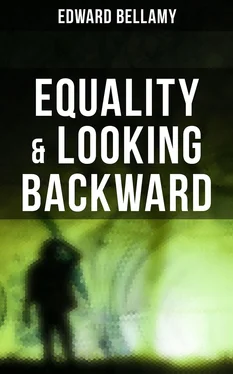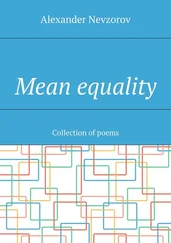“I am afraid I can’t give you even that consolation,” replied Dr. Leete, laughing. “In the first place, Mr. West, the newspaper press is by no means the only or, as we look at it, the best vehicle for serious criticism of public affairs. To us, the judgments of your newspapers on such themes seem generally to have been crude and flippant, as well as deeply tinctured with prejudice and bitterness. In so far as they may be taken as expressing public opinion, they give an unfavorable impression of the popular intelligence, while so far as they may have formed public opinion, the nation was not to be felicitated. Nowadays, when a citizen desires to make a serious impression upon the public mind as to any aspect of public affairs, he comes out with a book or pamphlet, published as other books are. But this is not because we lack newspapers and magazines, or that they lack the most absolute freedom. The newspaper press is organized so as to be a more perfect expression of public opinion than it possibly could be in your day, when private capital controlled and managed it primarily as a money-making business, and secondarily only as a mouthpiece for the people.”
“But,” said I, “if the government prints the papers at the public expense, how can it fail to control their policy? Who appoints the editors, if not the government?”
“The government does not pay the expense of the papers, nor appoint their editors, nor in any way exert the slightest influence on their policy,” replied Dr. Leete. “The people who take the paper pay the expense of its publication, choose its editor, and remove him when unsatisfactory. You will scarcely say, I think, that such a newspaper press is not a free organ of popular opinion.”
“Decidedly I shall not,” I replied, “but how is it practicable?”
“Nothing could be simpler. Supposing some of my neighbors or myself think we ought to have a newspaper reflecting our opinions, and devoted especially to our locality, trade, or profession. We go about among the people till we get the names of such a number that their annual subscriptions will meet the cost of the paper, which is little or big according to the largeness of its constituency. The amount of the subscriptions marked off the credits of the citizens guarantees the nation against loss in publishing the paper, its business, you understand, being that of a publisher purely, with no option to refuse the duty required. The subscribers to the paper now elect somebody as editor, who, if he accepts the office, is discharged from other service during his incumbency. Instead of paying a salary to him, as in your day, the subscribers pay the nation an indemnity equal to the cost of his support for taking him away from the general service. He manages the paper just as one of your editors did, except that he has no counting-room to obey, or interests of private capital as against the public good to defend. At the end of the first year, the subscribers for the next either re-elect the former editor or choose any one else to his place. An able editor, of course, keeps his place indefinitely. As the subscription list enlarges, the funds of the paper increase, and it is improved by the securing of more and better contributors, just as your papers were.”
“How is the staff of contributors recompensed, since they cannot be paid in money?”
“The editor settles with them the price of their wares. The amount is transferred to their individual credit from the guarantee credit of the paper, and a remission of service is granted the contributor for a length of time corresponding to the amount credited him, just as to other authors. As to magazines, the system is the same. Those interested in the prospectus of a new periodical pledge enough subscriptions to run it for a year; select their editor, who recompenses his contributors just as in the other case, the printing bureau furnishing the necessary force and material for publication, as a matter of course. When an editor’s services are no longer desired, if he cannot earn the right to his time by other literary work, he simply resumes his place in the industrial army. I should add that, though ordinarily the editor is elected only at the end of the year, and as a rule is continued in office for a term of years, in case of any sudden change he should give to the tone of the paper, provision is made for taking the sense of the subscribers as to his removal at any time.”
“However earnestly a man may long for leisure for purposes of study or meditation,” I remarked, “he cannot get out of the harness, if I understand you rightly, except in these two ways you have mentioned. He must either by literary, artistic, or inventive productiveness indemnify the nation for the loss of his services, or must get a sufficient number of other people to contribute to such an indemnity.”
“It is most certain,” replied Dr. Leete, “that no able-bodied man nowadays can evade his share of work and live on the toil of others, whether he calls himself by the fine name of student or confesses to being simply lazy. At the same time our system is elastic enough to give free play to every instinct of human nature which does not aim at dominating others or living on the fruit of others’ labor. There is not only the remission by indemnification but the remission by abnegation. Any man in his thirty-third year, his term of service being then half done, can obtain an honorable discharge from the army, provided he accepts for the rest of his life one half the rate of maintenance other citizens receive. It is quite possible to live on this amount, though one must forego the luxuries and elegancies of life, with some, perhaps, of its comforts.”
When the ladies retired that evening, Edith brought me a book and said:
“If you should be wakeful to-night, Mr. West, you might be interested in looking over this story by Berrian. It is considered his masterpiece, and will at least give you an idea what the stories nowadays are like.”
I sat up in my room that night reading “Penthesilia” till it grew gray in the east, and did not lay it down till I had finished it. And yet let no admirer of the great romancer of the twentieth century resent my saying that at the first reading what most impressed me was not so much what was in the book as what was left out of it. The story-writers of my day would have deemed the making of bricks without straw a light task compared with the construction of a romance from which should be excluded all effects drawn from the contrasts of wealth and poverty, education and ignorance, coarseness and refinement, high and low, all motives drawn from social pride and ambition, the desire of being richer or the fear of being poorer, together with sordid anxieties of any sort for one’s self or others; a romance in which there should, indeed, be love galore, but love unfretted by artificial barriers created by differences of station or possessions, owning no other law but that of the heart. The reading of “Penthesilia” was of more value than almost any amount of explanation would have been in giving me something like a general impression of the social aspect of the twentieth century. The information Dr. Leete had imparted was indeed extensive as to facts, but they had affected my mind as so many separate impressions, which I had as yet succeeded but imperfectly in making cohere. Berrian put them together for me in a picture.
3.I cannot sufficiently celebrate the glorious liberty that reigns in the public libraries of the twentieth century as compared with the intolerable management of those of the nineteenth century, in which the books were jealously railed away from the people, and obtainable only at an expenditure of time and red tape calculated to discourage any ordinary taste for literature.
Table of Contents
Читать дальше










